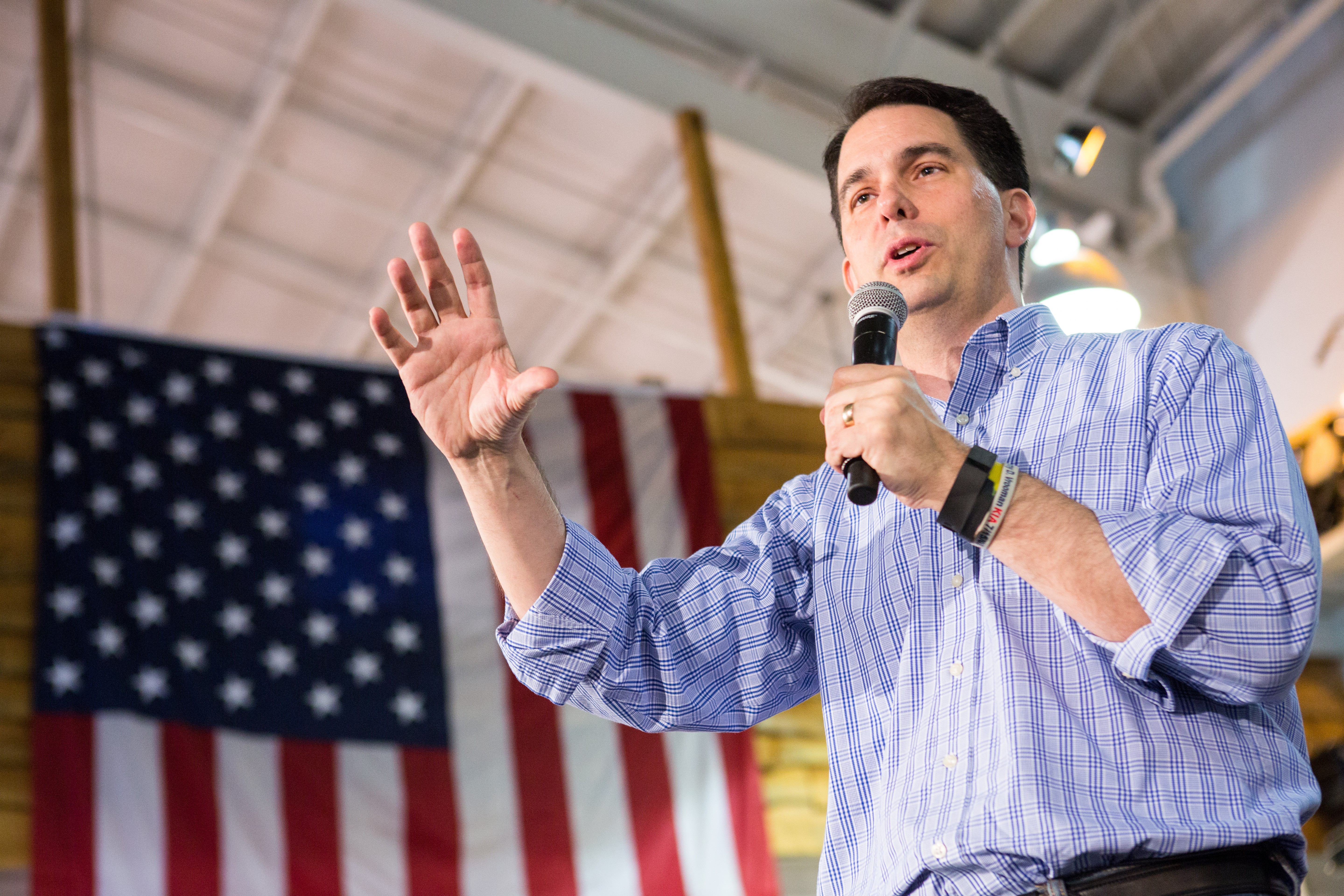How the presidential race is making the GOP's health care ideas even worse
Did you like the health care system circa 2009? Then you'll love Scott Walker's new health care plan.


Every major national Republican is sure that they want to repeal the Affordable Care Act. They are much less clear about what, if anything, they would do after stripping insurance from millions of people. Two plausible Republican nominees for president — Scott Walker and Marco Rubio — issued health care plans this week. And…let's just say there's a reason Republicans spend a lot more time on the "repeal" part of the "repeal and replace" equation.
Indeed, to call these positions "plans," as opposed to gestures in the direction of having a policy alternative, is probably too generous. As Jon Chait of New York puts it, they are "not so much plans as skeletal descriptions of planlike concepts." Still, even in larval form, Walker's plan contains several elements that are common to most Republican health care proposals, and that if enacted would result in horribly unpopular policy disasters. Here are the main features:
End the individual mandate
The Week
Escape your echo chamber. Get the facts behind the news, plus analysis from multiple perspectives.

Sign up for The Week's Free Newsletters
From our morning news briefing to a weekly Good News Newsletter, get the best of The Week delivered directly to your inbox.
From our morning news briefing to a weekly Good News Newsletter, get the best of The Week delivered directly to your inbox.
Most individual components of the Affordable Care Act are popular; the requirement that people carry insurance or pay a tax penalty is not. And since the mandate was very nearly the lever that gave a conservative Supreme Court majority a pretext to declare the ACA unconstitutional, Republicans have also convinced themselves that it is one of the greatest threats to liberty ever seen. So it is inevitable that any Republican proposal will advocate eliminating it, as Walker's does.
The problem is that the popular parts of the ACA can't be divorced from the mandate. If people are permitted to free-ride, the health insurance market can't work. Multiple states tried to initiate ACA-like reforms without a mandate, and it was a disaster — young and healthy people decline to buy insurance knowing they can get it if they fall sick, premiums increase, more people drop out, and the market collapses. This is why President Obama — who pandered during the 2008 primaries by putting forward a plan without a mandate — recanted as soon as he was in a position to actually try to get a law passed.
Make state regulations ineffective
Whenever conservatives have a policy they would prefer not to defend on the merits, the language of federalism comes in handy. In health care, virtually all Republican plans argue for permitting the purchase of insurance across state lines. Walker's is no exception: "My plan would allow individuals to shop in any state to find health insurance that covers the services they need at a price that fits the family budget."
A free daily email with the biggest news stories of the day – and the best features from TheWeek.com
In the abstract, a policy of permitting people to shop for insurance across state lines sounds attractive. In practice, it would be a regulatory race to the bottom. Insurance companies would gravitate to the states that place the fewest regulations on insurance industries. It would therefore become easier for insurance companies to deny claims, rescind insurance (or refuse to give it in the first place), and impose hidden costs. If you think credit card companies should be a model for health insurance companies, then Walker's plan might sound like a good idea. If you're thinking more clearly, it's obviously a terrible one.
Make it easier to sell junk insurance
Walker's plan would reduce federal regulations as well. The Affordable Care Act's requirement that insurance actually cover things would be eliminated, as would other provisions such as the popular requirement that children be allowed to stay on their parents' plan until age 26. Other provisions of the ACA, like the ban on discrimination based on pre-existing conditions, would be seriously weakened. So at the same time as Walker's plan would effectively eliminate many state regulations, it would also leave the insurance companies mostly unsupervised by federal regulations as well.
Conservatives would defend this awful idea by posing a choice between "regulation" and "competition." But the problem is that health care simply lacks the features of a competitive market. There's a reason why other liberal democracies have more state intervention into health care than the United States, not less. And by the way, they all cover more people for significantly less money.
Attack the poor
Walker's politics are not about small government. After all, he thinks that abortion should be illegal even when necessary to save a woman's life, and he just approved a $250 million gift of taxpayer money to hedge fund billionaires to build a basketball stadium. Rather, his politics are about assisting the rich and powerful at the expense of the poorer and less powerful.
His health care plan is no exception. Like the ACA, Walker's plan would offer tax credits to allow people to purchase insurance. But Walker's tax credits would be distributed on the basis of age, not income. The result, as Jeffrey Young and Jon Cohn demonstrate, would be a disaster for the non-affluent, as insurance would become unaffordable for many people at any age. And in addition, Walker also advocates savage cuts to Medicaid. The callousness Walker showed in refusing the ACA's Medicaid expansion in Wisconsin is reflected in his health care plans.
So Walker's plan would be an utter disaster if implemented. But it's not just about Walker. Amazingly, some conservative candidates and pundits attacked Walker's plan from the right. A spokesman for also-ran candidate Bobby Jindal accused Walker of collaborating with Bernie Sanders to create a plan that would make health care far less accessible to the non-rich.
Essentially, Republicans look at the state of health care circa 2009 — in which more than 16 percent of Americans were uninsured, and in which insurance companies could abuse consumers in a number of ways — and argue that even fewer Americans should have insurance and the quality of the insurance should be much worse. This is one of the many reasons that the contemporary Republican Party is simply unfit to govern at the national level.
Scott Lemieux is a professor of political science at the College of Saint Rose in Albany, N.Y., with a focus on the Supreme Court and constitutional law. He is a frequent contributor to the American Prospect and blogs for Lawyers, Guns and Money.
-
 New START: the final US-Russia nuclear treaty about to expire
New START: the final US-Russia nuclear treaty about to expireThe Explainer The last agreement between Washington and Moscow expires within weeks
-
 What do the people of Greenland want for their future?
What do the people of Greenland want for their future?As Europe prevaricates over US threats for annexation there is a unifying feeling of self-determination among Greenlanders
-
 Time blindness: is being late a disorder?
Time blindness: is being late a disorder?In The Spotlight Understanding the cause of chronic tardiness can save a relationship
-
 The billionaires’ wealth tax: a catastrophe for California?
The billionaires’ wealth tax: a catastrophe for California?Talking Point Peter Thiel and Larry Page preparing to change state residency
-
 Bari Weiss’ ‘60 Minutes’ scandal is about more than one report
Bari Weiss’ ‘60 Minutes’ scandal is about more than one reportIN THE SPOTLIGHT By blocking an approved segment on a controversial prison holding US deportees in El Salvador, the editor-in-chief of CBS News has become the main story
-
 Has Zohran Mamdani shown the Democrats how to win again?
Has Zohran Mamdani shown the Democrats how to win again?Today’s Big Question New York City mayoral election touted as victory for left-wing populists but moderate centrist wins elsewhere present more complex path for Democratic Party
-
 Millions turn out for anti-Trump ‘No Kings’ rallies
Millions turn out for anti-Trump ‘No Kings’ ralliesSpeed Read An estimated 7 million people participated, 2 million more than at the first ‘No Kings’ protest in June
-
 Ghislaine Maxwell: angling for a Trump pardon
Ghislaine Maxwell: angling for a Trump pardonTalking Point Convicted sex trafficker's testimony could shed new light on president's links to Jeffrey Epstein
-
 The last words and final moments of 40 presidents
The last words and final moments of 40 presidentsThe Explainer Some are eloquent quotes worthy of the holders of the highest office in the nation, and others... aren't
-
 The JFK files: the truth at last?
The JFK files: the truth at last?In The Spotlight More than 64,000 previously classified documents relating the 1963 assassination of John F. Kennedy have been released by the Trump administration
-
 'Seriously, not literally': how should the world take Donald Trump?
'Seriously, not literally': how should the world take Donald Trump?Today's big question White House rhetoric and reality look likely to become increasingly blurred
